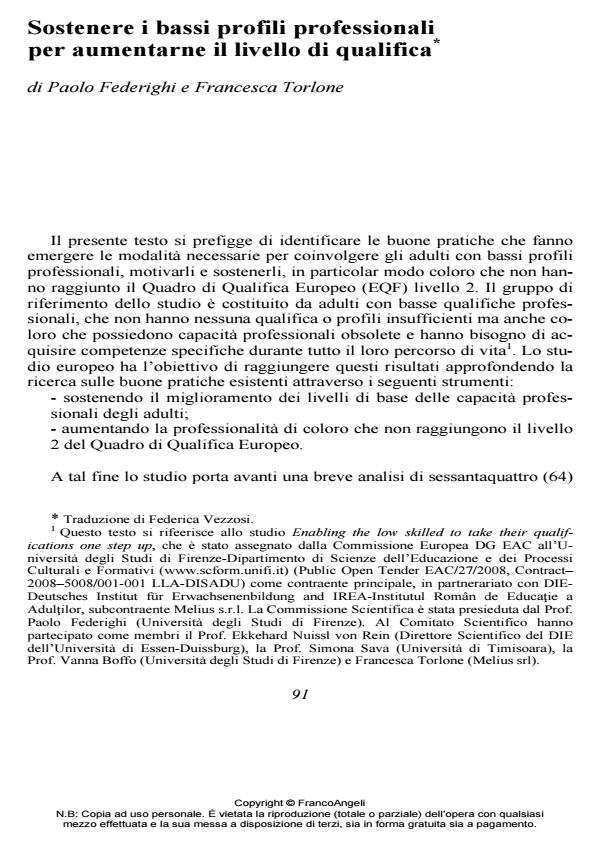Sostenere i bassi profili professionali per aumentarne il livello di qualifica
Titolo Rivista EDUCATIONAL REFLECTIVE PRACTICES
Autori/Curatori Paolo Federighi, Francesca Torlone
Anno di pubblicazione 2011 Fascicolo 2011/1-2
Lingua Italiano Numero pagine 19 P. 91-109 Dimensione file 517 KB
DOI 10.3280/ERP2011-001006
Il DOI è il codice a barre della proprietà intellettuale: per saperne di più
clicca qui
Qui sotto puoi vedere in anteprima la prima pagina di questo articolo.
Se questo articolo ti interessa, lo puoi acquistare (e scaricare in formato pdf) seguendo le facili indicazioni per acquistare il download credit. Acquista Download Credits per scaricare questo Articolo in formato PDF

FrancoAngeli è membro della Publishers International Linking Association, Inc (PILA)associazione indipendente e non profit per facilitare (attraverso i servizi tecnologici implementati da CrossRef.org) l’accesso degli studiosi ai contenuti digitali nelle pubblicazioni professionali e scientifiche
The object of the present essay is the identification of good practices that show how to reach adults who are under-qualified, and to motivate and support them, especially if they have not attained the European Qualification Framework (EQF) level 2. This is in accordance with the Action Plan on Adult Learning (European Commission, 2007). The target group is composed of adults who are under-qualified, or with no or aninsufficient qualification, or whose professional skills are obsolete and who need to acquire key competences at all stages in their lives. The European study intended to achieve these results by investigating existing good practices: (i) supporting improvement of basic skill levels of adults and (ii) raising the qualification levels of those who do not have the EQF level 2. To this end, the article provides a short analysis of sixty-four Good Practices from thirty-three European countries. Fourteen of them have also been analyzed through the Case Study method. The good practices and case studies pocus on concrete operational strategies then are implemented by different public and private actors. The complex institutional, regulatory and systemic framework available in the European countries has not been investigated as the present Report is focused on concrete practices. A "practice" can be deemed "good" in consideration of the results achieved in a specific context. This is the criterion followed by the research team in the selection of good practices adopted in thirty-three European countries. The examples were delivered by national correspondents who had responsibility for an intimate knowledge of the good practices and of how they have been adopted and developed in their national/local territory or sector.
Paolo Federighi, Francesca Torlone, Sostenere i bassi profili professionali per aumentarne il livello di qualifica in "EDUCATIONAL REFLECTIVE PRACTICES" 1-2/2011, pp 91-109, DOI: 10.3280/ERP2011-001006